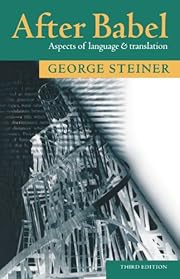

Pulse en una miniatura para ir a Google Books.
|
Cargando... DESPUÉS DE BABEL (Aspectos del Lenguaje y la Traducción) (1975)por George Steiner

Actualmente no hay Conversaciones sobre este libro.   ) )George Steiner's classic study of the peculiar nature of translation as a literary and linguistic process, which drags you through some fairly knotty thickets of the philosophy of language before opening up in the last couple of chapters into a string of brilliant case-studies. We get to think about why there are different languages in the first place, and about how — since the meaning of words shifts between contexts, times and individuals — any reading of a text anywhere is going to involve some kind of translation. And we get to confront the paradox that whilst an "exact" 1:1 translation between different languages, even of the most trivial phrase, is clearly impossible, we still use translations every day and find them helpful. Even the most complex and baffling literary texts have been translated in ways that seem to serve a useful purpose for readers and scholars. This is something of a literary steeple-chase, where we are expected to cope with references from a broad range of literature, linguistics, philosophy and other disciplines (in numerous different languages). At one point we leap straight from a detailed discussion of prophecy in the Old Testament to a (non-trivial) excursion into statistical thermodynamics and the Second Law. So you will need that parachute. But it is fun, and when we get to the case-studies of how literary translation is actually done it is also very useful. For those who do Translation Studies, are translators, or are doing anything comparative in their post-secondary education, this book is a must-read. It gives a detailed, comprehensive history of the practice of translation, beginning with its roots in biblical studies. Steiner never quite looses sight of the spiritual aspects of translation, in the religious and post-Hegelian sense of the word. He writes an especially adept analysis of Walter Benjamin's "The Task of the Translator" that clarifies Benjamin's somewhat murky text, making it accessible and, moreover, *useful* for the translator-scholar. I recommend getting the most recent edition, and not buying a used copy of an older addition, as the introductions to the new editions generally amend and add information to the original text which was written in the '70s, I believe. All in all, this book should be on the shelf of anyone interested in "world literature"--i.e. literature in translation--because it is essential that we question the efficacy of translation, its necessity, its drawbacks, and the ways it enriches our understanding of language, society and art. sin reseñas | añadir una reseña
PremiosListas de sobresalientes
Despu s de Babel ensaya una larga historia, m s extensa que la de cualquier imperio y tan remota como la de las m s antiguas lenguas conocidas. Una historia que no se limita a la de ning n pueblo y que, en rigor, deber a abarcar la de todos. Aqu se deslinda una geograf a y recuerda una historia: la de la traducci n en Occidente. No se han encontrado descripciones de biblioteca. |
Debates activosNingunoCubiertas populares
 Google Books — Cargando... Google Books — Cargando...GénerosSistema Decimal Melvil (DDC)418.02Language Linguistics Standard usage (Prescriptive linguistics) TranslatingClasificación de la Biblioteca del CongresoValoraciónPromedio: (3.84) (3.84)
¿Eres tú?Conviértete en un Autor de LibraryThing. |
||||||||||||||||||||||||||||||||||||||||||||||||||||||||||||||||||||||||||||||||||||||||||||||||||||||||||||||||||||||||||